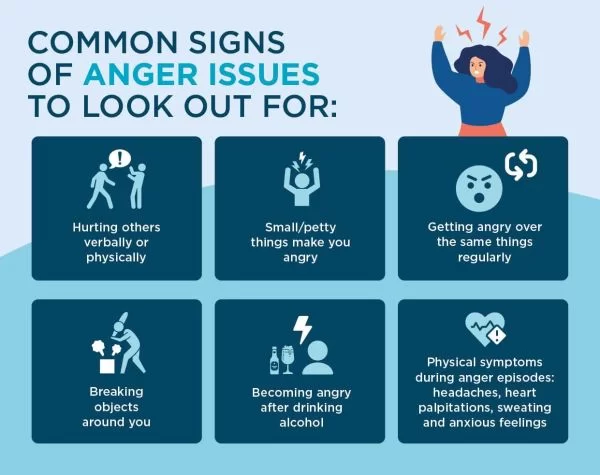Anger is a natural human emotion that we all experience at some point in our lives. It is a strong feeling of displeasure or hostility that can manifest in various ways, from mild irritation to explosive rage. While anger can be a healthy and useful emotion in some situations, it can also be destructive and harmful when expressed inappropriately or excessively. It can be a healthy and productive emotion when expressed appropriately, such as when it motivates us to make positive changes in our lives or to stand up for ourselves or others. However, when anger is not managed effectively, it can lead to negative consequences such as strained relationships, increased stress and anxiety, and even physical harm to ourselves and others. In this blog, we will explore the nature of anger, its causes, effects, and ways of managing it effectively.
Anger can be defined as a strong emotional response to a perceived threat, injustice, or frustration. It is a complex emotion that involves physiological, cognitive, and behavioral responses. When we feel angry, our heart rate increases, our blood pressure rises, and our muscles tense up. We also experience a range of cognitive changes, such as narrowed focus, reduced self-awareness, and heightened arousal. These changes prepare us to take action to protect ourselves or assert our needs and rights.
There are many different causes of anger, including external events, internal factors, and individual differences. External events that can trigger anger include physical or emotional harm, perceived disrespect or injustice, frustration, and provocation. Internal factors that can contribute to anger include past experiences, beliefs, expectations, and personality traits. Individual differences, such as gender, culture, and social status, can also influence how people express and perceive anger.
The effects of anger can be both positive and negative, depending on how it is expressed and managed. In the short term, anger can be energizing and motivating, helping us to defend ourselves, solve problems, and achieve goals. It can also signal to others that we are serious about our needs and boundaries. However, when anger is expressed inappropriately or excessively, it can have negative consequences for our health, relationships, and well-being. Chronic anger has been linked to a range of physical and mental health problems, such as heart disease, high blood pressure, anxiety, and depression. It can also damage our relationships with others, leading to conflict, aggression, and social isolation.
Given the potential negative consequences of anger, it is important to learn how to manage it effectively. There are many different strategies for managing anger, ranging from cognitive and behavioral techniques to mindfulness and relaxation exercises. One effective approach is cognitive restructuring, which involves identifying and challenging negative thoughts and beliefs that contribute to anger. For example, instead of automatically assuming that someone is disrespecting us, we can consider alternative explanations for their behavior, such as cultural differences or miscommunication.
Another effective strategy is behavioral activation, which involves engaging in activities that promote positive emotions and reduce stress. This can include exercise, hobbies, socializing, and self-care activities. By focusing on positive experiences and emotions, we can reduce our reliance on anger as a coping mechanism.
Mindfulness and relaxation techniques can also be helpful for managing anger. These practices involve cultivating awareness and acceptance of our thoughts and emotions, without judgment or attachment. By learning to observe our thoughts and emotions with curiosity and compassion, we can reduce our reactivity to triggers and develop greater emotional regulation.

The following are some of the strategies for managing anger effectively.
1. Recognize and acknowledge your anger
The first step in managing anger effectively is to recognize and acknowledge it. Sometimes we may be unaware of our anger or may deny it because we believe that it is not socially acceptable to be angry. However, acknowledging and accepting your anger is important because it allows you to take responsibility for your emotions and take steps to manage them effectively.
2. Identify the source of your anger
Once you have recognized and acknowledged your anger, the next step is to identify the source of your anger. Anger can be triggered by a variety of things, such as a perceived injustice, frustration, or feeling threatened. Understanding what is causing your anger can help you address the root of the problem rather than just the symptoms.
3. Take a break
When you are feeling angry, it can be helpful to take a break from the situation or person that is causing your anger. This can give you time to calm down and think more clearly about the situation. Some ways to take a break include going for a walk, practicing deep breathing or meditation, or engaging in a relaxing activity such as listening to music or reading a book.
4. Use “I” statements
When communicating with others about your anger, it is important to use “I” statements rather than “you” statements. For example, instead of saying “You are making me so angry!”, you can say “I am feeling angry right now because of what you said/did”. This can help prevent the other person from becoming defensive and can lead to a more productive conversation.
5. Practice active listening
When communicating with others about your anger, it is also important to practice active listening. This means really listening to what the other person is saying rather than just waiting for your turn to speak. When you actively listen, you can better understand the other person’s perspective and can respond in a more thoughtful and effective way.
6. Use humor
Using humor can be a helpful way to diffuse a tense situation and reduce anger. However, it is important to use humor in a way that is respectful and appropriate. Making fun of the other person or using sarcasm can make the situation worse rather than better.
7. Practice forgiveness
Practicing forgiveness can be a powerful way to manage anger. When we hold onto anger and resentment, it can harm us more than the other person. Forgiving the other person does not mean that we condone their behavior or forget what happened, but it does mean that we are choosing to let go of the negative feelings associated with the situation.
8. Seek professional help
If you are struggling to manage your anger on your own, it may be helpful to seek professional help. A mental health professional can work with you to identify the underlying causes of your anger and develop strategies for managing it effectively. They can also provide support and guidance as you navigate the process of managing your anger.
Anger is a natural and normal emotion that we all experience from time to time. However, when anger is not managed effectively, it can lead to negative consequences. By recognizing and acknowledging our anger, identifying the source of our anger, taking a break, using “I” statements, practicing active listening, and using humor, we can learn how to manage it effectively and cultivate greater emotional well-being. While it can be a useful and necessary response to certain situations, it can also be destructive and harmful when expressed inappropriately or excessively. With the right tools and techniques, we can transform anger from a source of conflict and distress into a source of empowerment and growth.
Blog By:-
Dr. Shikha Dugar
Assistant Professor
Department of Commerce and Management



